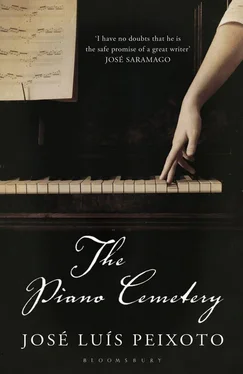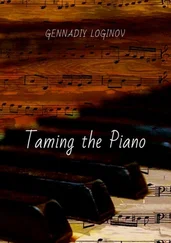It was a teaspoon that my wife, as a girl, had bought to give to her godmother. It was a delicate, simple spoon. At the end of the handle she had engraved a single small word: mother.
Simão never wanted to know. My wife always worried. He never wanted to know. He was still small when my wife and I said to him:
‘Your sisters are going to be someone, and you’ll be nobody. Your sisters are going to be ashamed of you. Two sisters who’re going to be someone with a brother who will be nobody.’
He turned his back on us. And went up to his room. My wife and I would be left there, saying nothing. At other times he would be harsh. He’d shout:
‘Leave me alone!’
And turn his back on us. And go up to his room. I’d say:
‘There’s something wrong with that boy.’
At other times I’d follow him up the stairs and go into his room. He’d open his left eye wide and almost lifted the lid off the right. I’d squeeze his arms and shake him as I said:
‘Is that any way to talk to your father?!’
Íris is nearly three, and she knows it’s different going into the workshop now, just as it was different last Sunday, as it was different in those days when she would arrive at the workshop with her grandmother, with her mother, to visit Uncle Francisco. Today the workshop is empty — the little birds, the little birds in the roof beams — and her grandmother hearing every step she takes on the earth floor of the entrance, she’s thinking about something, but there’s only the empty workshop — the objects alone there, the solitude of the tools, of the pieces of wood, of the pianos.
My wife knows it’s different going into the workshop now. On Sunday there was something in her that was soothed by the voices of our daughters, of our grandchildren. At times it was like those afternoons when I was still alive, when she would gather all our children together and together they would all come into the workshop. Now, everyone knows, it’s different.
My wife stops at the threshold of the carpentry shop. Íris lets go of her hand. My wife doesn’t have the strength to hold on to her. Íris moves away slowly. Stumbling twice on loose stones, she reaches the entrance to the piano cemetery. My wife’s tired voice:
‘Don’t touch anything.’
After a moment when she’s listening to her grandmother, Íris’s smile and her eyes — light or shadows on the surface of the sea — and the curls that roll down on to her shoulders and her little body disappear into the piano cemetery. For years my wife has known about the blind passion that children feel for the piano cemetery. Before now it has been Marta, Maria. It has been Simão, Francisco. My wife knows that no harm has ever come to them. Which is why she doesn’t worry, and returns to her thoughts. She returns to her body, ruffled, untidy under her clothes, as though her clothes have stopped being quite right for her, as though her arms are no longer the same length and are longer or shorter than the sleeves, as though her torso has turned around itself and its shape will no longer fit the shape of the blouse. My wife returns to herself, and takes a step into the carpentry shop.
I don’t know what she’s looking for. Perhaps she needs some empty time.
Íris hits the keys of an upright piano with both hands — a confused noise; the noise of her hands hitting the keys mingles with the noise of the detached or crooked mechanisms against the old wood, and mingles with a shy note, forced against its will to be heard. And again. Again. And she’s had enough. The walls of the piano cemetery are cool. The light comes in through the dirty little window and is lost. Íris is so small. Her sandals accompany the movement that her body makes as it turns around itself. She finds the lid of the same legless piano where she sat on Sunday. In the dust surface there are still traces of that passing. She sits. She looks at me, and says:
‘Are you still talking to the people from the book?’
‘I am.’
Silence.
‘Are you tired?’
‘Not yet.’
‘You really could be by now. Don’t you ever rest, Grandad?’
‘I can’t. I have to tell this story to the end.’
Silence. Íris puts the plastic hairbrush down on the piano lid, puts down the hairpins and mirror. She has her back to me as she leans down to rummage around in a pile of keys. In her hands each key seems too big. She has her back to me. She says:
‘When I’m big I can read the book, too, can’t I?’
I smile.
‘Yes, of course.’
Silence. She turns her face towards me.
‘Grandad, tomorrow I’m going to be big, aren’t I?’
‘Yes, Íris, tomorrow you’re going to be big.’
We smile together.
‘When I’m big I might even know how to play the piano, right?’
‘Yes, but you’ll have to learn at school.’
‘That’s all right. Teacher will teach me and then I’ll play a piano for my mother.’
‘Do you think your mother will like it?’
‘She will. She’ll even get so happy that she’ll ask me to play another song. One of those songs. . A love song.’
She turns her face towards me. She covers her mouth, waiting for my reaction.
‘But don’t be sad, Grandad. Then I’ll play a song for you, too. Except that I’ll play a grandad song.’
‘What’s that like, a grandad song?’
‘It’s a song with words from the little girls who are the granddaughters and the mothers singing them.’
‘So will your mother sing, then?’
‘No, it’s the music that has the words. When I play a piano you can hear the words that are inside the piano.’
She moves towards an upright piano, and away. She takes little steps, marked in the dust, her gaze fixed as though she were filling up with ideas. She freezes in the middle of a step. Slowly she puts the sole of her sandal down on the floor. She smiles. She says:
‘I went with Granny to the market.’
‘I know.’
She sits back down on the piano lid.
‘Granny bought me a brush for me to brush my hair.’
‘Yes, I know.’
She puts the brush and the hairpins in the folds of her skirt, on her lap. She holds up the mirror in front of her face, and in the little reflected circle she sees skin, lips, an eye.
‘Then you also know what happened.’
‘Yes, I know.’
‘And what are you going to do? Will you hate all gypsies? That would be easy enough to do. Whenever there’s a conversation that relates even vaguely to gypsies, with markets, with fairs, you’ll take advantage of the moment to spread your poison. And underneath everything you say, hidden away, buried away, there will be that feeling you have. That’s something you’re good at. You know how to hate. You know how to impose your opinions and not let anyone contradict you. You know how to bring conversations to an end. If, of course, you weren’t dead, if you could still have conversations.
‘But we’re having one, aren’t we?’
‘We are?’
‘Again you’re talking as though you weren’t a little girl who’s not yet even three.’
She continues looking at herself in the little mirror that she’s holding in front of her face. She has the hairbrush in her other hand, and she starts brushing. Slowly.
‘What is it you’re afraid of, anyway? Are you afraid that I’m going to talk about Uncle Simão? It’s nobody’s fault that you can’t forget the image of a little boy, your son, up against a wall, blind in one eye, terrified, knowing he can’t run away, and you walking towards him, closing your fists, burning inside. Are you afraid that I’m going to talk about Uncle Francisco? It’s three days till he runs in the marathon at the Olympic Games, on his own, always on his own, thinking that you never valued all the things he did just to please you. And, just the same, trying everything he can to win. Even knowing that if you weren’t dead, if he got home and showed you the medal for first place, you’d turn your face away, uninterested.’
Читать дальше












